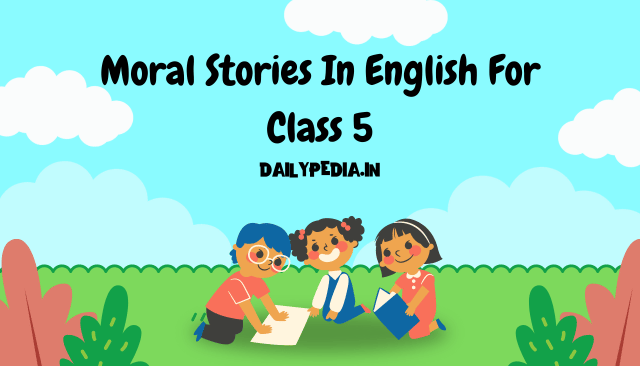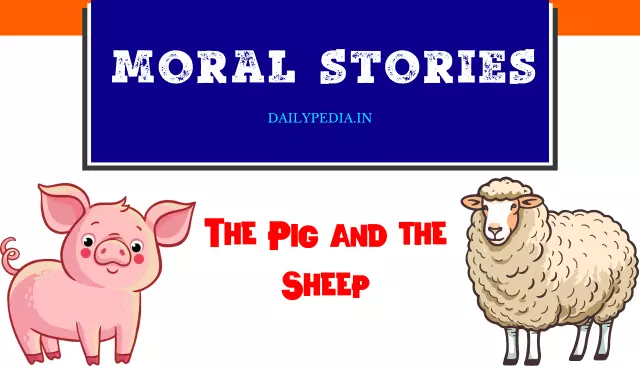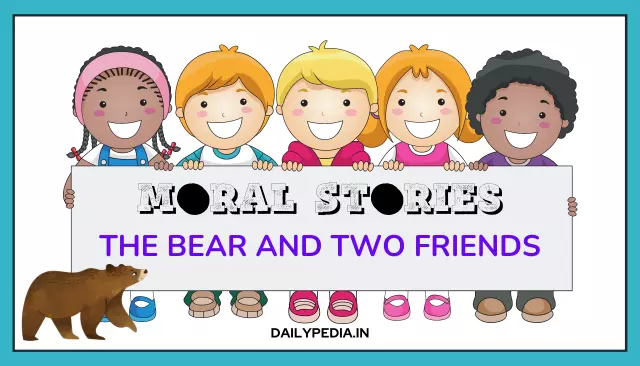Moral Stories In English For Class 5 – I create moral stories in English for 5th-grade articles. Students seeking the finest moral stories for their 5th-grade class, complete with accompanying images, will find this article beneficial. These succinct English short stories tailored for 5th graders are designed to be of great assistance. Kindly proceed to scroll down and engage with the article.
The most recent and distinctive narratives available on the internet are featured here. We have also included a detailed overview of Moral Stories for Class 5 in English, ensuring a comprehensive understanding of our content.

Moral Stories In English For Class 5
The Golden Egg
Once upon a time in a quaint village, lived a poor farmer named Ravi and his wife, Leela. Despite their hardships, they were content with the little they had. One day, while tending to their modest farm, they stumbled upon an astonishing discovery that would change their lives forever.
As Ravi was plowing the field, his plow struck something hard. To his astonishment, he unearthed a glittering golden egg. Ravi and Leela couldn’t believe their luck. They took the egg home and marveled at its beauty. However, as days turned into weeks, they faced a dilemma. Should they keep the egg as a precious possession or should they try to uncover its secret?

Curiosity got the better of them, and they decided to crack open the egg to uncover its contents. To their surprise, the egg wasn’t solid gold but contained an intricate necklace studded with precious gems. The couple was overjoyed by their discovery, but this joy was short-lived.
As they tried to sell the necklace, they found it difficult to find a buyer who was willing to pay its true worth. Eventually, a merchant offered them a meager sum, taking advantage of their desperation. Disheartened and feeling cheated, Ravi and Leela returned home with heavy hearts.
That night, they had a vivid dream. In the dream, a wise old man appeared before them and spoke, “You were given a gift that could have changed your lives, but your greed clouded your judgment. The real treasure lay not in the necklace, but in the golden egg itself.”
Ravi and Leela woke up with a newfound understanding. They realized that their greed had blinded them to the true value of the golden egg. The next day, they decided to keep the egg as it was and not focus on its potential material value.
Over time, the villagers came to know about the golden egg and its story. People from far and wide visited Ravi and Leela to hear the tale of their realization. The couple’s contentment and willingness to share their story left a profound impact on everyone who heard it.
Moral Education:
The story of “The Golden Egg” teaches us an important lesson about the dangers of greed and the true value of what we possess. It illustrates that material possessions, while valuable, should not blind us to the intrinsic worth of what we have. The pursuit of wealth and possessions can lead us to overlook the simple joys, relationships, and contentment that life offers.
The story also emphasizes the significance of learning from our mistakes and experiences. Ravi and Leela’s initial desire to sell the egg for a quick gain led to disappointment and regret. However, their willingness to reflect on their choices and embrace a more meaningful perspective transformed their lives and impacted others positively.
In a world often driven by materialism and the quest for more, “The Golden Egg” serves as a reminder that true richness comes from appreciating and cherishing what we have, valuing relationships, and finding contentment in life’s simple pleasures.
The Pig and the Sheep
In a lush green meadow, a pig named Percy and a sheep named Shirley lived alongside each other. They were good friends despite their differences. Percy, the pig, loved to roll around in the mud and enjoy the freedom of the open field. Shirley, the sheep, was more reserved and spent her days grazing on the tender grass.
One sunny day, as they lay basking in the warmth, Percy turned to Shirley and said, “Shirley, you spend all your time nibbling on grass. It’s such a monotonous life. You should come join me in the mud. It’s incredibly liberating!”

Shirley smiled and replied, “Percy, I’m glad you enjoy the mud, but it’s not something that suits me. I find contentment in grazing and feeling the gentle breeze. Each of us has our own way of finding happiness.”
Percy couldn’t comprehend Shirley’s response. He thought she was missing out on life’s pleasures by not embracing the mud baths. He persisted, “But Shirley, don’t you want to experience something different? Mud is fun and exciting! You’re letting life pass you by.”
Shirley remained calm and said, “Percy, just because something is enjoyable for you doesn’t mean it’s enjoyable for me. I’m happy with my routine, just as you are with yours. We can appreciate each other’s choices without imposing them on one another.”
As time went by, Percy continued to enjoy his mud baths while Shirley continued to graze peacefully. One day, a heavy rainstorm swept across the meadow, turning it into a muddy mess. Percy was in his element, relishing the mud all around. However, Shirley found herself struggling to navigate the muddy terrain with her delicate hooves.
Seeing Shirley’s difficulties, Percy realized that his enjoyment of the mud wasn’t universal. He rushed to help Shirley, guiding her to a drier spot. Grateful, Shirley thanked Percy for his kindness.
Moral Education:
“The Pig and the Sheep” imparts a valuable lesson about embracing diversity and respecting individual preferences. The story underscores that people have different ways of finding happiness and fulfillment. Just because something brings joy to one person doesn’t mean it will have the same effect on another.
The tale encourages us to avoid imposing our preferences onto others. Percy’s attempts to convince Shirley to enjoy mud baths were well-intentioned but misguided. Instead, we should respect and appreciate the choices that others make for their own well-being and happiness.
Furthermore, the story highlights the importance of empathy and understanding. Percy gained insight into Shirley’s perspective only when he saw her struggle in the muddy environment. This experience helped him realize that his version of happiness might not apply universally.
In a world with diverse backgrounds, cultures, and personal preferences, “The Pig and the Sheep” encourages us to celebrate differences and find common ground without trying to change others to fit our mold. By doing so, we can foster harmony, respect, and a sense of unity among people who may have varying ways of finding contentment.
When Adversity Knock
In a small village nestled between rolling hills, there lived a young boy named Arjun. He was known throughout the village for his boundless energy, optimism, and a smile that could brighten even the cloudiest day. Despite being from a modest background, Arjun’s zest for life was infectious, and he was loved by everyone.
One day, a dark cloud of adversity descended upon the village. A severe drought gripped the land, causing crops to wither and streams to dry up. The villagers’ spirits sank as they faced the prospect of scarcity and hunger. Arjun’s family, like the others, felt the impact deeply.

Undeterred by the dire circumstances, Arjun decided to take matters into his own hands. He began to explore the hills around the village, searching for any hidden water sources. Day after day, he ventured farther, braving the scorching sun and exhaustion. His determination and perseverance were unwavering.
As he journeyed deeper into the hills, Arjun discovered a small, hidden spring. It was a source of water that had miraculously survived the drought. Overjoyed, he rushed back to the village to share his discovery with the villagers. With renewed hope, they all made their way to the spring and started collecting water for their families and farms.
Arjun’s actions inspired others to join in the effort. Together, they constructed channels to bring the water down to the village, reviving the crops and bringing life back to the land. The village started to bloom once again, thanks to Arjun’s determination, positive spirit, and his refusal to be defeated by adversity.
Moral Education:
“When Adversity Knocked” conveys a powerful lesson about resilience, determination, and the ability to find solutions even in the face of adversity. Arjun’s character exemplifies the idea that challenges, no matter how insurmountable they may seem, can be overcome through a combination of determination, optimism, and hard work.
The story emphasizes the importance of proactive problem-solving. Instead of succumbing to despair and helplessness, Arjun took initiative and sought out solutions. His willingness to explore, learn, and adapt played a pivotal role in changing the circumstances for his village.
Additionally, the tale teaches us the impact of leading by example. Arjun’s determination inspired others to join his cause. His positive attitude and unyielding effort created a ripple effect, rallying the community to collaborate and overcome their shared hardships.
In a broader sense, “When Adversity Knocked” encourages us to view challenges as opportunities for growth and transformation. Adversity can often unveil hidden strengths within us, and it is up to us to harness those strengths to make a positive difference. By remaining resilient and proactive, we can not only navigate through difficult times but also inspire those around us to do the same.
The Fox And The Stork
In a lush forest, lived a clever and mischievous fox named Felix. He was known far and wide for his cunning nature and knack for playing tricks on others. One day, he decided to play a prank on his friend, a kind and gentle stork named Stella.
Felix invited Stella over for a meal. However, when Stella arrived, she found that Felix had served the food in a shallow dish, perfect for his own snout, but impossible for Stella’s long beak to access. The fox chuckled at his own deviousness, watching Stella struggle to reach the food.

Stella, maintaining her composure, thanked Felix for the meal and left without a complaint. Determined to teach Felix a lesson, she invited him to her home the next day, claiming she wanted to reciprocate his hospitality.
When Felix arrived, he found Stella’s dining table set with tall, narrow vases. Inside the vases were delicious treats that Stella could easily access with her beak, but for Felix, it was an impossible task. He left Stella’s home feeling hungry and embarrassed.
Realizing that he had been outwitted, Felix returned to apologize to Stella for his thoughtless prank. He acknowledged the error of his ways and admired Stella’s grace under pressure.
From that day forward, Felix and Stella’s friendship grew stronger, built on mutual respect and understanding.
Moral Education:
“The Fox and the Stork” imparts an essential lesson about empathy, respect, and treating others as we would like to be treated. The story reveals the consequences of playing tricks on others without considering their feelings and perspectives.
The tale underscores the importance of putting ourselves in others’ shoes. Felix thought his prank was amusing, but he failed to consider how it would make Stella feel. Stella’s response, however, was a reminder that kindness and consideration are more valuable than trying to gain an advantage through trickery.
Furthermore, the story highlights the significance of taking responsibility for our actions. When Felix realized his mistake, he didn’t hesitate to admit it and apologize. This shows the transformative power of self-reflection and the willingness to make amends.
In a world where respect and empathy are crucial for harmonious relationships, “The Fox and the Stork” serves as a reminder that we should treat others with fairness, kindness, and understanding. By doing so, we can foster genuine connections and build strong bonds based on trust and mutual respect.
When Adversity Knocks
In a quaint village nestled between the mountains, lived a young boy named Aiden. He was known throughout the village for his cheerful disposition and unwavering determination. Aiden’s family owned a small farm that had been their source of livelihood for generations. They worked hard, tending to the fields and animals with love and care.
One year, a series of misfortunes struck the village. First, a drought parched the land, causing their crops to wither away. Then, a powerful storm destroyed their barn, leaving their animals without shelter. Despite these hardships, Aiden’s family refused to lose hope. They decided to rebuild the barn and explore new ways to irrigate their fields.

Aiden, too, played his part. He spent hours studying books on farming techniques and innovative methods to preserve water. His determination was infectious, and soon, other villagers joined in, offering support and sharing their own ideas. With their collective efforts, a new irrigation system was developed, and the barn was rebuilt stronger than before.
As the village slowly recovered, Aiden’s family found their fields blooming again, and their animals thrived in the new barn. The unity and resilience they had shown during adversity had not only saved their livelihood but had also strengthened the bonds within the community.
Moral Education:
“When Adversity Knocks” imparts a vital lesson about resilience, community, and finding strength in challenging times. Aiden’s story exemplifies the power of unity and determination when faced with adversity.
The story highlights the importance of a positive mindset in the face of difficulties. Aiden’s family could have succumbed to despair and given up, but instead, they chose to face the challenges head-on and work together to find solutions. This attitude not only helped them overcome their hardships but also inspired others to join in their efforts.
The tale underscores the value of collaboration and collective action. Aiden’s willingness to seek knowledge and involve the community in finding solutions shows that sometimes, the best way to overcome adversity is by coming together and sharing ideas and resources. In doing so, individuals can harness the power of teamwork to achieve remarkable results.
Furthermore, “When Adversity Knocks” reminds us that setbacks are opportunities for growth and innovation. Adversity can act as a catalyst for change, prompting us to think creatively, adapt, and discover new ways to navigate challenges.
In a world that often presents obstacles and uncertainties, the story encourages us to remain steadfast in the face of adversity, to lean on our communities for support, and to view challenges as stepping stones toward personal and collective progress.
The Boy Who Cried Wolf
In a tranquil village nestled in the hills, lived a mischievous young boy named Liam. Liam was known for his playful nature and love for pranks. He often sought attention by inventing stories and creating scenarios to entertain himself.
One day, while tending to the village’s sheep, Liam grew bored. He decided to play a trick on the villagers. He shouted, “Wolf! Wolf!” with all his might, pretending that a fearsome wolf was attacking the sheep. The alarmed villagers rushed to his aid, only to find Liam giggling and sheep grazing peacefully.

Liam found the villagers’ reactions amusing, and he repeated the prank a few more times over the following days. Each time, the villagers rushed to the scene, worried for the sheep’s safety, only to be met with Liam’s laughter.
However, Liam’s antics came with consequences. One day, a real wolf did appear on the hillside. Liam, genuinely frightened this time, cried out for help, “Wolf! Wolf!” But this time, when the villagers heard his cries, they hesitated. They remembered his past pranks and questioned the authenticity of his plea.
Tragically, Liam’s cries for help went unanswered, and the wolf attacked the sheep. Liam realized that his dishonesty had eroded the villagers’ trust, and his actions had serious consequences.
Moral Education:
“The Boy Who Cried Wolf” delivers a powerful lesson about the importance of honesty, integrity, and the consequences of our actions. The story highlights the impact of deceiving others and how it can lead to a loss of credibility, even in times of genuine need.
The tale emphasizes that trust is a fragile commodity. Liam’s repeated lies caused the villagers to doubt his sincerity, which ultimately resulted in dire consequences when he actually needed their help. This illustrates how dishonesty can damage relationships and undermine the foundation of trust that holds communities together.
The story encourages individuals to be accountable for their words and actions. It teaches us that honesty is not only about telling the truth but also about being responsible and considerate of how our behavior affects others. Liam’s pranks showed a lack of consideration for the villagers’ time, efforts, and emotions.
In a broader context, “The Boy Who Cried Wolf” serves as a cautionary tale against seeking attention through deceit. It urges us to value our credibility and the trust of those around us. By being truthful and reliable, we can foster genuine connections, maintain the respect of others, and ensure that our words carry weight when we truly need help or support.
The Bear and Two Friends
Deep within a lush forest, two friends, Leo the lion and Max the monkey, lived together. Despite their differences, they shared an unbreakable bond of friendship. One day, as they explored the woods, they stumbled upon a bear trapped in a pitfall. The bear pleaded for help, promising to reward them generously if they freed him.
Leo and Max were moved by the bear’s plea. Leo, being strong and brave, wanted to rescue the bear immediately. Max, however, was cautious. He warned Leo that the bear might harm them once it was free, as bears were known to be fierce predators.

Leo, driven by compassion, decided to help the bear nonetheless. He jumped into the pit and, using his strength, managed to pull the bear out. True to its word, the bear promised them a grand feast in gratitude.
The three animals walked together to the bear’s den. Along the way, they encountered a beehive hanging from a tree. Max, the monkey, noticed the beehive and realized that the bear’s intention might not be as innocent as it seemed. He quietly whispered to Leo about his suspicion.
Thinking quickly, Leo suggested they should climb the tree to get the beehive down for the feast. Max and Leo climbed up and shook the beehive, causing the angry bees to swarm around them. In the chaos, they managed to escape the bear’s clutches and found refuge in the treetop.
As the bees dispersed, the bear was left empty-handed and frustrated. It realized that Leo and Max had been cautious and had outsmarted its deceitful plan. The bear grumbled and walked away, while Leo and Max safely returned to the forest floor.
Moral Education:
“The Bear and Two Friends” imparts a crucial lesson about the importance of cautiousness, discernment, and the value of true friendship. The story underlines that it’s essential to evaluate situations carefully and consider potential risks before making decisions, even when driven by compassion.
The story also highlights the significance of trust and communication within friendships. Max’s cautiousness and his willingness to share his concerns with Leo ultimately saved them from potential danger. This demonstrates that open and honest communication is key to making informed choices and avoiding pitfalls.
Furthermore, the tale showcases the idea that not everyone who claims to be a friend has honorable intentions. While helping others is a noble endeavor, it’s important to exercise judgment and ensure that our kindness isn’t taken advantage of by those with ulterior motives.
In a world where kindness and trust are paramount, “The Bear and Two Friends” encourages us to be both compassionate and cautious. It teaches us to combine our empathy with wisdom, allowing us to make choices that are both well-intentioned and safeguarded against potential harm.
Also Read
Moral Stories in English for Class 1
Moral Stories in English for Class 2
Moral Stories In English For Class 3
Moral Stories In English For Class 4